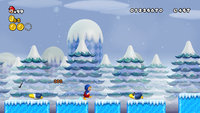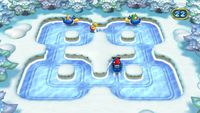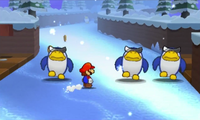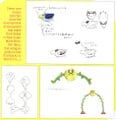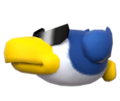Cooligan
| Cooligan | |||
|---|---|---|---|
 An unused Cooligan in Dr. Mario World | |||
| First appearance | New Super Mario Bros. Wii (2009) | ||
| Latest appearance | Mario Golf: Super Rush (version 3.0.0) (2021) | ||
| Subject origin | Penguin | ||
| |||
- “Hey, shouldn't those weird sliding things stop for crossing pedestrians? What a bunch of road hogs.”
- —Kersti, Paper Mario: Sticker Star
Cooligans are blue, penguin-like creatures sporting a pair of sunglasses that first appear in New Super Mario Bros. Wii. Their name is a portmanteau of the words "cool" and "hooligan".
History
Super Mario series
New Super Mario Bros. Wii
These enemies first appear in World 3-1, and later appear in World 9-5. They are seen sliding and can damage Mario and the others if they run into one of them, although if Mario or anyone else is in the Penguin Suit and they are sliding too, then they bounce off unhurt. It takes two jumps to defeat one; one jump knocks off a Cooligan's sunglasses first, slowing it down. They also fall down holes rather than hover over them. In this state, if rammed by another Cooligan, it gets defeated.
Cooligans can be defeated instantly by a Fire Flower, Star, Ice Flower, Penguin Suit, or Ground Pound. Cooligans continue to slide even if they are frozen, and as such can be used as platforms.
The Cooligan's attack pattern is notably similar to another penguin-based enemy, the Lemguin.
New Super Mario Bros. U / New Super Luigi U / New Super Mario Bros. U Deluxe
Cooligans return in New Super Mario Bros. U and New Super Mario Bros. U Deluxe, first found in Frosted Glacier, specifically in Cooligan Fields. They behave in a similar manner as in New Super Mario Bros. Wii. They also appear as the Frosted Glacier Enemy Course. In this game, they can slide on the surface of water, similar to Penguin Mario. Cooligans can be eaten by Baby Yoshis in this game, and also trapped in bubbles blown by a Bubble Baby Yoshi.
Cooligans return in New Super Luigi U in their own level, Cooligan Shrooms, which itself replaces Cooligan Fields.
Mario Party 9
Snowmobiles that resemble Cooligans make an appearance in Mob Sleds in Mario Party 9. They are piloted by the three players as they attempt to eliminate the solo player.
Paper Mario: Sticker Star
Cooligans make their Paper Mario series debut in Paper Mario: Sticker Star, where they appear in the Snow Rise and Ice Flow levels of World 4. In the former level, they are seen sliding down a snow-covered slope. In the latter level, Cooligans are seen waddling down the ice path before sliding; this is the first instance in which Cooligans are shown walking. Mario can not face Cooligans in battle, but he will lose 2 HP if he crashes into them.
Mario can jump on a sliding Cooligan to make it disappear instantly. In the Snow Rise level, once Mario uses the Radiator sticker, three Cooligans can be seen stuck, showing that they cannot slide without ice, and hop if Mario uses his hammer near them. In the Ice Flow level, sometimes a Curling Stone, Rubber Ducky, or Cat-o-Luck Thing slide down the ice trail along with the Cooligans.
Mario Golf: Super Rush
Cooligans appear in Mario Golf: Super Rush as obstacles in Blustery Basin. In Speed Golf, they can be defeated by dashing into or jumping on them since contact will slow players down.
Gallery
New Super Mario Bros. Wii concept art
Names in other languages
| Language | Name | Meaning | Notes |
|---|---|---|---|
| Chinese (simplified) | 企鹅仔[1] Qǐ'é Zǎi |
Penguin Guy | |
| Chinese (traditional) | 企鵝仔[3] Qǐ'é Zǎi |
Penguin Guy | |
| Dutch | Cooligan[?] | ? | |
| French (NOA) | Pinfrais[?] | From "pingouin" (penguin) and "frais" (cool) | |
| French (NOE) | Pinglisse[?] | From "pingouin" (penguin) and "glisse" (slide) | |
| German | Pincool[?] | From "pinguin" (penguin) and "cool" | |
| Italian | Cooligan[2] Pinguastro |
- From "pinguino" (penguin) and the prejorative suffix "-astro" |
|
| Korean | 펭군[?] Penggun |
From "펭귄" (penggwin, penguin) and "~군" (-gun, a Korean honorific for "young boy"), similar to Japanese honorific「~くん」(-kun) | |
| Portuguese (NOA) | Pinguiri[?] | ? | |
| Portuguese (NOE) | Cooligan[?] | ? | |
| Russian | Кулиган[?] Kuligan |
Transliteration of English name | |
| Spanish (NOA) | Pingüino fino[?] | Fine Penguin | |
| Spanish (NOE) | Pingüizador[?] | From "pingüino" (penguin) and possibly "deslizador" ("slider" or "speedboat") |
